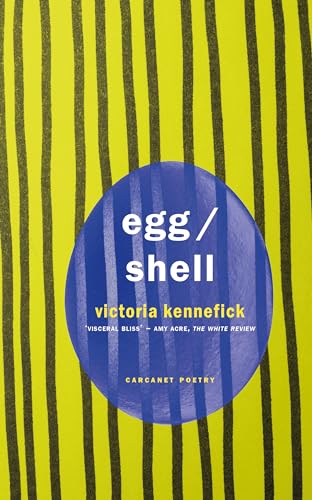REVIEW: VICTORIA KENNEFICK’S ‘EGG/SHELL’
BY Stella Backhouse

Victoria Kennefick’s 2024 collection Egg/Shell has two sections: ‘Egg/’ and ‘/Shell’. Outside either of them is a poem called ‘Ram’. In a collection whose dominant theme is the female body, ‘Ram’ stands apart as a poem about a male body. Significantly perhaps, given what comes later, it is a dead male body, and only the skull, its horns proclaiming unmistakable maleness even after life has ceased. Contemplating it, the poet remembers “those hollow orbs – /the thin fragments of skull clinging/together to give shape to an idea”. The collection as a whole is shaped around imagery of the egg but here is a different kind of shell. The question its vagueness/clarity seems to ask is: is gender only an idea? Or an enduring, unerasable given?
The first part of Egg/Shell is about Kennefick’s secondary infertility, which manifests itself as repeated miscarriages while she continues to care for her existing child. Content including descriptions of blood loss down the toilet will not be for everyone. And as an unsexy female who never wanted children, I felt, at times, more excluded than ever from the world of womanhood by Kennefick’s poems of a relationship with her female body defined by its (in)fertility. The subject of the second section of the book is ostensibly something unrelated: the ending of Kennefick’s marriage after her then-husband came out as trans and began living as a woman. Constant throughout, perhaps, is the question of what the difference actually is between a woman who cannot conceive, and a transwoman. Enduring biological reality? Or only an idea, held together by fragile fragments of social norms?
Of course this is a highly controversial subject. It’s important to be clear firstly that the later poems are not about the experience of being trans – they are about the experience of being the partner of someone who comes out as trans; and secondly that Kennefick and her ex-spouse retain a mutually-supportive relationship. Presiding over both elements of the collection is the unifying metaphor of the egg. Its relevance to the first part is obvious; its relevance to the second part hinges on the slang expression ‘to crack one’s egg’ meaning ‘to realise one is trans’. Other repeated motifs include swans – a bird for which Kennefick feels particular affinity – and clothing, especially when torn off or discarded.
In ‘Egg/’ a mood of sadness is dominant as Kennefick watches a swan at a local lake whose clutch doesn’t hatch; and particularly in the poems she writes to her miscarried babies, each one identified by name. The concrete poem ‘Cup’, which could also be the shape of a miscarrying womb, describes a fragile heirloom that has no function now it has a crack in it. When Kennefick asks “Is it, or isn’t it, still a cup?”, she is also asking questions about defining womanhood and her own female identity. In ‘/Shell’ the mood subtly shifts to one where frustration and resentment at times show through. Again, identity is at issue: the corollary of Kennefick’s partner’s new identity is her loss of identity as a wife. In ‘On wondering whether to expunge the word husband from my previous poems’ she says “I am not the wife, that W/a rollercoaster/of a letter – /I’ve fallen down its side”. The poem concludes with a sarcastic “I am glad/your new name makes you happy,/the way husband/never could”. Hurt also bleeds over into the next poem, which consists of blocks of words – ‘husband’, ‘he’ and ‘his’ – repeatedly, angrily, crossed out. Again and again, the word ‘shock’ appears.
In the penultimate poem, ‘Child of Lir’, the Irish legend of the Children of Lir is used to position the themes of swans and transformation alongside Kennefick’s grief and also the sense of compassion and humanity that was evident in the first section. Kennefick tells her ex-spouse she wants “to celebrate with you the hurrying away from/a body that didn’t fit” but also envisions herself “standing/by the wreckage. I will be weeping like a wife”. Readers who find the specific subject matter of this collection too difficult could instead view it less as a meditation on gender and more as a mourning for a life the poet expected to live (loving husband, big brood of children) that was taken away. Either way, it is a delicate, elegiac and generous collection that brings a luminous touch to the very roots of human experience.
Egg/Shell is available to purchase online, direct from publisher Carcanet Press, as well as other bookshops and retailers.
